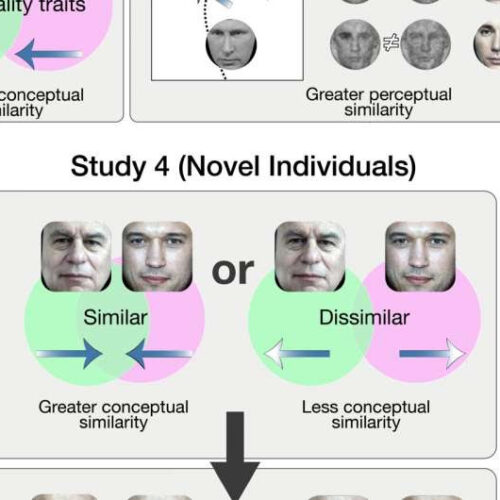About 1 in 6 Americans are age 65 or older, and that percentage is projected to grow. Older adults often hold positions of power, have retirement savings accumulated over the course of their lifetimes, and make important financial and health-related decisions – all of which makes them attractive targets for financial exploitation.In 2021, there were...
Tag: <span>psychologists</span>
Psychologists create first-ever body-maps of hallucinations
by University of Leicester Credit: Pixabay/CC0 Public Domain University of Leicester psychologists have, for the first time, created body-maps of the sensations that arise during hallucinations in people experiencing psychosis. The study, published in The Lancet’s EClinicalMedicine, provides the most extensive descriptive data to date on the feelings that arise during hallucinations and where individuals reported...
People look alike if we think they have similar personalities, new study finds
by New York University Knowledge of a person’s personality can warp the perception of a face’s identity and bias it toward alternate identities that are ostensibly unrelated. For example, if Vladimir Putin and Justin Bieber (above) have more similar personalities in your mind, then they visually appear more similar to you as well–as shown in the...
Psychologists report an error in the NICE guidelines for autism
UNIVERSITY OF BATH Reporting in the Lancet Psychiatry today, psychologists at the University of Bath highlight that a widely used technique for autism screening is being misused, which may have prevented many people from receiving an autism diagnosis over the past decade. When individuals with suspected autism are assessed by a GP, a decision to refer them...
Research explores how the brain functions
What does each part of the brain do and why? Can we communicate with a patient in a coma? How does continual cell phone screen-time affect us? These are the kind of questions that Brian Arwari ponders every day. A cognitive psychologist by training, he leads the neurocognitive lab in the Department of Kinesiology and...
New therapy more effective than cognitive behavioral therapy for depression
by Michael Addelman, University of Manchester A new therapy developed at The University of Manchester is better at treating depression than cognitive behavioral therapy—or CBT—seen as the gold standard by psychologists and health providers. The study, published in Frontiers in Psychology, is the first full-scale randomized trial of metacognitive therapy (MCT), developed by Professor Adrian...
When do children begin to recognize hypocrisy?
by Jack Wang, University of Chicago Practice what you preach. Suit your actions to your words. Walk the talk. Hypocrisy is ingrained as a moral failing for most adults, but when do children learn to make the same distinction? According to a new study from University of Chicago psychologists, the shift seems to happen early...
How cortisol affects exposure therapy for anxiety disorders
by Ruhr-Universitaet-Bochum Bochum-based psychologists have studied how the application of the stress hormone cortisol affects exposure therapy for anxiety disorders. The researchers knew from earlier studies that extinction learning, which constitutes the foundation of exposuretherapy, can be reinforced by administering cortisol. However, the team headed by Professor Armin Zlomuzica at Zentrum für Psychotherapie (psychotherapy centre) at Ruhr-Universität Bochum (RUB) has demonstrated with a group of...
7 famous psych studies with troubling backstories
Psychology 101 textbooks typically include epic tales of the discipline’s history. They chronicle inventive experiments and dazzling results from days of old. But many of the things we think we know about the human mind—like the depth of the parent-child bond, or our inclination to submit to authority even when it feels unethical—come from research that’s since...
Depression speeds up brain aging, find psychologists
Psychologists at the University of Sussex have found a link between depression and an acceleration of the rate at which the brain ages. Although scientists have previously reported that people with depression or anxiety have an increased risk of dementia in later life, this is the first study that provides comprehensive evidence for the effect...




